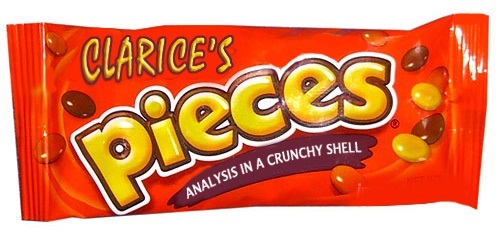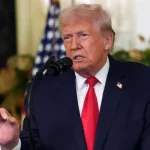
–>
June 11, 2023
Just as Hollywood seems stuck on the notion of releasing new versions of once-popular films using new actors, the corrupt Department of Justice seems to be using the same tattered playbook once again in the preposterous and ill-considered indictment of President Trump. Only if you saw the originals, you know the plot tricks this time.
‘); googletag.cmd.push(function () { googletag.display(‘div-gpt-ad-1609268089992-0’); }); document.write(”); googletag.cmd.push(function() { googletag.pubads().addEventListener(‘slotRenderEnded’, function(event) { if (event.slot.getSlotElementId() == “div-hre-Americanthinker—New-3028”) { googletag.display(“div-hre-Americanthinker—New-3028”); } }); }); }
I refer you to the Lewis “Scooter” Libby and Senator Ted Stevens cases I’ve written about here. In particular, the detailed account of the former case in the now defunct Weekly Standard. It was written in 2006 and is now in the Washington Examiner archives. If it is difficult for you to access, this more recent and less detailed article may help refresh your recollection.
Here are some of the common features: Count Stacking — that is, separating a single matter into multiple counts for the purpose of poisoning the public, sensationalizing the case, and persuading a jury that there’s a pony in all that dung. (In this case, I’d add, dissuading voters from continuing to support Trump.) Cherry picking statements out of context, sometimes relying on both hearsay and misrepresentations. Leaking to the press even information which is false. Allegations aren’t evidence, and with this corrupt Department of Justice, you’d be wise to remember that.
Here are some examples: The indictment shows many boxes stacked in a bathroom and ballroom at Mar-a-Lago, but most of those seem to be simply memorabilia that Trump saved, like presidents before him. In fact, the government claims that of the 13,000 documents they seized at Trump’s residence, only 102 had “classified markings” and only 31 are in issue, of which only 21 are claimed to be related to “national defense.” The President retains his secret clearance after leaving office. Why show all those boxes stored unsecured? Certainly, to create a certain impression of massive amounts of secret materials. The indictment indicates just six top-secret and 18 secret documents were in his office. The other 11 top-secret and 36 secret documents were in a storage facility onsite, which had a lock and key that was specified by the government in a security audit weeks before the raid in the midst of a discussion over which documents were to be kept by Trump, a fact omitted from the indictment. Moreover, the entire facility was guarded round the clock by the Secret Service. Compare and contrast with Biden’s careless treatment of 1850 boxes of government documents scattered about unsecured in the University of Delaware, University of Pennsylvania, Chinatown D.C., and a garage.
‘); googletag.cmd.push(function () { googletag.display(‘div-gpt-ad-1609270365559-0’); }); document.write(”); googletag.cmd.push(function() { googletag.pubads().addEventListener(‘slotRenderEnded’, function(event) { if (event.slot.getSlotElementId() == “div-hre-Americanthinker—New-3035”) { googletag.display(“div-hre-Americanthinker—New-3035”); } }); }); }
“In the middle of directing the difficult task of transferring the historically important records of the Obama administration into the National Archives, the archivist in charge, David Ferriero, ran into a serious problem: A lot of key records are missing.” “And yet the accumulation of recent congressional testimony has made it clear that the Obama administration itself engaged in the wholesale destruction and “loss” of tens of thousands of government records covered under the act as well as the intentional evasion of the government records recording system by engaging in private email exchanges.” – “Crisis at the National Archives”
If you recall, the prosecutor in the Libby case knew that Richard Armitage, not Lewis Libby, had leaked the name of Valerie Plame and kept that secret from the public, the Court and the defendant when he made his impassioned speech announcing the indictment and the government admitted after the fact that the leak jeopardized no agents’ lives despite the prosecutor’s outrageous closing speech to the jury. That prejudicial speech offered Libby two choices: let it stand with some cautionary language from the judge, which was unlikely to undo the damage, or demand a mistrial in which case he’d have to go through this expensive and draining exercise again. In that case, too, a NYT reporter was jailed to force her to testify against Libby and she did so only after having been misled by the prosecution — a deception she realized only after the conviction.
In the Stevens case, the government suborned perjury, hid a critical witness for the defense, and suffered no consequences of note for that. With Stevens out of the Senate, the Democrats rammed through ObamaCare before the serious misconduct of the FBI and DoJ attorneys was known, too late to provide solace to Stevens, who died in a plane crash before the truth was revealed.
Here is one critical difference between those cases and this one. In the Stevens case, the court in my view erred in retaining jurisdiction in the certainly prejudiced D.C. courts despite the fact that the witnesses and subject matter were in Alaska. In the Libby case, he was equally unlucky to be forced to defend himself before such a biased panel. In this case, it will be tried in a far more favorable jurisdiction, South Florida, where Trump remains much admired. Any appeals will be to the Eleventh Circuit, not the D.C. Circuit, and Justice Clarence Thomas has jurisdiction over that Circuit.
 In the Libby Case and the case of General Mike Flynn, the FBI sandbagged them, questioning them without counsel present and pretextually and then relying on “notes” of interviews to discredit them, notes written not contemporaneously and of dubious accuracy. (Never speak to an FBI agent no matter how friendly the conversation seems to be without counsel present and your own recording, preferably by video, of the discussion. Never.)
In the Libby Case and the case of General Mike Flynn, the FBI sandbagged them, questioning them without counsel present and pretextually and then relying on “notes” of interviews to discredit them, notes written not contemporaneously and of dubious accuracy. (Never speak to an FBI agent no matter how friendly the conversation seems to be without counsel present and your own recording, preferably by video, of the discussion. Never.)
In the Libby case, the target was certainly Vice President Dick Cheney and the hope (which proved fruitless) was to get him to avoid prosecution by naming his boss, truthfully or not.
‘); googletag.cmd.push(function () { googletag.display(‘div-gpt-ad-1609268078422-0’); }); document.write(”); googletag.cmd.push(function() { googletag.pubads().addEventListener(‘slotRenderEnded’, function(event) { if (event.slot.getSlotElementId() == “div-hre-Americanthinker—New-3027”) { googletag.display(“div-hre-Americanthinker—New-3027”); } }); }); } if (publir_show_ads) { document.write(“
In this case, the prosecution is trying to put the squeeze on Trump’s valet. In absence of evidence, the prosecution’s hope is terrorizing the innocent with expensive and anxiety-producing terror to induce them to provide the evidence they don’t have.
I’m in accord with Judicial Watch’s Tom Fitton.
Judicial Watch has nearly 30 years of experience litigating federal and presidential records issues, including the famous “Clinton sock drawer” case. The document dishonestly ignores the U.S. Constitution, the Presidential Records Act, legal precedent, and the DOJ’s/Archives’ previous position that WH records a president takes with him when he leaves the White House are presumptively personal and not subject to review by partisan Biden appointees at DOJ or Archives. Under the Constitution, federal law and precedent, none of the documents are currently “classified” or “national defense information” that restricts Trump’s handing of them. They are ALL his personal records and, frankly, should be returned to him. If justice prevails, this indictment won’t survive scrutiny by honest, constitutionalist judges and will be thrown out. #ProsecutorialMisconduct
The Wall Street Journal editors provide more commentary on the relevant laws.
The indictment levels 37 charges against Mr. Trump that are related to his handling of classified documents, including at his Mar-a-Lago club, since he left the White House. Thirty-one of the counts are for violating the ancient and seldom-enforced Espionage Act for the “willful retention of national defense information.”
But it’s striking, and legally notable, that the indictment never mentions the Presidential Records Act (PRA) that allows a President access to documents, both classified and unclassified, once he leaves office. It allows for good-faith negotiation with the National Archives. Yet the indictment assumes that Pres. Trump had no right to take any classified documents.
This doesn’t fit the spirit or letter of the PRA, which was written by Congress to recognize that such documents had previously been the property of former Presidents. If the Espionage Act means Presidents can’t retain any classified documents, then the PRA is all but meaningless. This will be part of Trump’s defense.
Based largely on the reports of a former assistant director of the FBI, the House Judiciary Committee has detailed the irregularities of the raid on Mar-a-Lago and demanded answers and records from Attorney General Merrick Garland.
Other hurdles for the prosecution include the fact that the supposed big tell, a conversation Trump supposedly had at the Bedminster golf club, was leaked before any of the participants to this supposed conversation were questioned. The leak comes from inside the DoJ and to the best of my knowledge the prosecution has no copy of whatever document Trump supposedly had in hand during the reported conversation. “If so, the prosecution must be investigated and punished. Also, this is grounds for granting a motion highlighting jury pool poisoning and dismissing the indictment before it reaches even its one-month birthday.”
Should I be terribly wrong and the case proceeds to a conviction, in his second term Trump can pardon himself.
<!–
–>
<!– if(page_width_onload <= 479) { document.write("
“); googletag.cmd.push(function() { googletag.display(‘div-gpt-ad-1345489840937-4’); }); } –> If you experience technical problems, please write to [email protected]
FOLLOW US ON
<!–
–>
<!– _qoptions={ qacct:”p-9bKF-NgTuSFM6″ }; ![]() –> <!—-> <!– var addthis_share = { email_template: “new_template” } –>
–> <!—-> <!– var addthis_share = { email_template: “new_template” } –>






